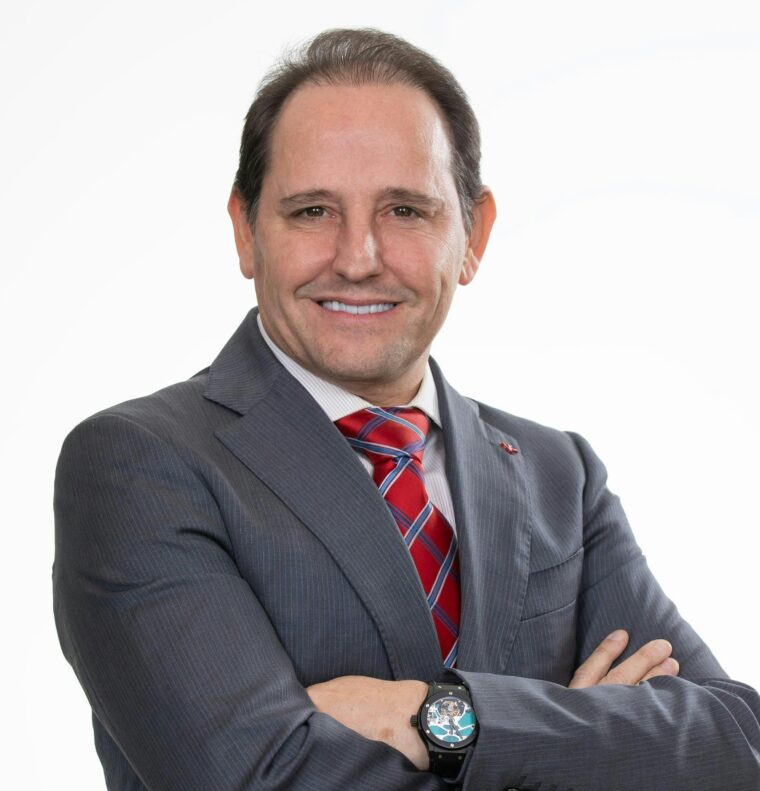Portuguese people who stand out abroad are helping to find out where business opportunities are and what kind of companies and activities the country can attract. An initiative that brings together Negócios and the Portuguese Diaspora Council.
1. What led you to leave Portugal?
I joined Science of the Time at the beginning of 2009 to support the transformation of the research unit into a consultancy unit. So, back in 2009, when we were defining target markets outside Europe at the company’s head office in Amsterdam, Brazil came first, given its size and maturity in the business areas in which we operate. As I have a history with Brazil (from the time I worked as a partner in an advertising agency owned by Washington (Olivetto – 2002/2003), it was a relatively easy and normal decision to go to Brazil to test the market and the business. I went in 2011 for a two-year journey and, to this day, the journey continues. We did the ‘spin-off’ in 2014 and since then, although occasionally linked to the parent company, we have been treading a solo path. These were decisions taken a little fearfully (moving to Brazil and spinning off the headquarters), but they have proved to be the right ones on a professional and personal level: not only because of the company’s growth, but also because of the personal change it has brought me with the birth of my son.
2. What advantages or disadvantages has being Portuguese brought you?
Naturally, there’s a historical connection between the countries and that’s a great advantage. That’s been the biggest advantage, which has meant that I’ve always been welcomed by everyone throughout these 15 years. Honestly, I’ve never felt a disadvantage being Portuguese in Brazil. Apart from the jokes that are told about the Portuguese (laughs), I’ve never felt any resistance to being Portuguese – quite the opposite. Coming from Europe (whatever country you’re from) opens up opportunities. The Old Continent still has its charm and, perhaps because of its older age, is gaining respect from the so-called emerging economies. I admit that this may also have been a facilitating factor. Then, without a doubt, our unique value proposition made the difference. There were no companies that dealt with the issue of trend scenarios and strategic innovation in an integrated way like we did and in a market that was highly open to innovation – this was a factor in accelerating acceptance and growth.
3. What obstacles did you have to overcome and how did you do it?
The biggest obstacle was bureaucracy. It has improved a lot in recent years, with the digitalisation of services in general, but without a doubt the biggest obstacle was bureaucracy – from the visa, to starting a business and even opening a bank account, for example. A lot of patience, resilience and meditation helped. But everything always worked out. Being a country on a continental scale, things always take longer – for example, while my son’s Portuguese nationality came through in 6 months, my Brazilian one has already taken 2 years and, as of the date of this interview, is still unresolved. There is also (although it may seem unreasonable) some need to adapt the language – we don’t speak the same language. Words, sentences, phrasal constructions and grammar are very different. Thinking that we’ve arrived in Brazil and that the Portuguese mother tongue is the same can create pitfalls and misunderstandings. On the other hand, you have to get to know and get used to the local culture and ways of doing things, at all levels. You have to know the terrain, the rules of the game, the dynamics of the market and how to operate in it. Not that this is an obstacle, but you need to know how to behave in other people’s homes, in this case in other people’s countries. Then there’s the security factor, which forces us to adopt very different precautionary behaviours to those in Europe.
4. What do you admire most about the country you’re in?
The continental dimension, which opens many doors, and of course the fantastic friendliness and energy of Brazilians, which is contagious and makes us want to stay. Then there’s the geographical and gastronomic diversity that gives us so many memories. But what I admire most is the ability to live day to day – it’s something that surprises me. Brazilians are very adaptable and have a great capacity to reinvent themselves. When something goes wrong, they don’t turn their backs on it. I’ve learnt a lot from them about how to deal with the unexpected. I’ve been a fan of Brazil since the first day I arrived. I’m lucky enough to have travelled a path that keeps me in love with the country and wanting to continue this journey.
5. What do you admire most about your company/organisation?
Our ability to think differently, innovate and break new ground. We’ve been successful because of our ability to take risks and test new approaches. This is what I admire most about the organisation, coupled with a sensational team of professionals from whom I learn every day since 2011 when I arrived in São Paulo. When we talked about scenarios, trends or innovation, I always saw looks of doubt about whether or not we would be able to help companies. Over the years, we have demonstrated the methodologies’ ability to succeed, and the company always tries to bring something more. We say that each client becomes a friend and this is perhaps the biggest differentiator that I admire about Inova. Companies are people and businesses are people, and when we look at things from this perspective everything becomes easier and more exciting to do.
6. What recommendations would you give to Portugal and its entrepreneurs and managers?
We need to get out of the bubble. Portugal is still too closed in on itself, looking outwards too little. And there is a new global context that needs to be taken advantage of. We (Portuguese in general) are extremely competent as professionals, but we get stuck to a self-centred mental model, often influenced by the fact that we are a small country. We have given worlds to the world (a cliché phrase) and now we no longer seem to have the capacity to break new ground. There is a great challenge of constant training and updating, which is the basis of a more entrepreneurial culture that we have lost in recent decades. I think Europe as a whole is losing out in terms of its entrepreneurial and innovative capacity compared to other regions of the world.
7. In which sectors of the country where you live can Portuguese companies find clients?
In a continental country there are naturally many opportunities. I would choose the most attractive market segments, such as agriculture, education, retail, technology, the financial and insurance markets and, of course, public services. In all of them there is a high level of professionalism, but also (and because of this) many business opportunities. Coming from Europe (in this case Portugal), this is a great advantage. But be aware that in a country of this size you need to have the right approach. You could die from succeeding.
8. What sectors in Portugal might companies from the country you’re in want to invest in?
Portugal as a country needs to develop a vision of the future – what we want to be in 10, 20, 30 years’ time. What is our differential? The people? The culture? The gastronomy? The history? These answers don’t exist. Or if they do exist, only a few know them. With this lens as a context, I would say that, for me, the Tourism, Real Estate, Food, Health (and related services), Fashion and Education sectors, in general, are extremely attractive target markets. When you read this, you might think: ‘but all of this already exists in Portugal with high quality’. Yes, that’s true, but a breath of fresh air could help to further develop these areas, which are, in my view, strategic for the country – and in this context we have Brazilian players who can greatly help the country’s development in these territories.
9. What competitive advantage does your country have that could be replicated in Portugal?
Brazil, especially executive and business Brazil, has an unrivalled entrepreneurial and innovative capacity, coupled with a willingness to take risks, perhaps influenced by the USA and its entrepreneurial streak. Portugal (and perhaps Europe as a whole) needs to be bolder and more innovative, less closed in on itself and less conservative on management issues.
10. Are you thinking of moving back to Portugal? Why?
We always go back, whether on holiday or for work. Today, with operations in Brazil and Portugal, we spend a lot of time on the so-called air bridge. So I can say that I’m still in Portugal. But I’ve also learnt throughout my life that the future is built day by day. In other words, I don’t know, and anything can happen. Whether in Brazil or Portugal, as long as we’re with the people we love, we’ll always be at home.
See the original article here.







